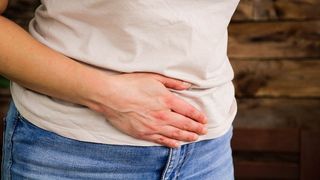4 dairy free diet benefits
Dairy free diet benefits can include better digestion, clearer skin, boosted energy levels and even weight loss. So is it worth giving it a try?

Eating a variety of foods is essential for good health, but for some people, the dairy free diet benefits are the main driver behind changing their lifestyle. Milk is rich in calcium and protein, but many people are allergic or sensitive to dairy or just don’t like the taste or idea of it. Besides, with the best vegan protein powders becoming more and more popular, there are other ways to meet your protein needs without consuming dairy.
This is a welcome relief, with more and more of us identifying as being lactose intolerant, a condition where the body is unable to properly digest lactose, the natural sugar found in milk. This can lead to a range of uncomfortable symptoms that include abdominal pain, bloating, nausea and diarrhea. Meanwhile, calcium-fortified dairy substitutes like almond, coconut, oat, rice and soy milk are growing in popularity, with half of all US consumers admitting to buying both real dairy and dairy alternatives, according to a Cargill study.
One of the top benefits of cutting out dairy is the removal of excess saturated fats, sugar and salt from your diet, which can reduce your calorie intake and promote a healthy weight. Dairy is also renowned for being acidic, disrupting the body's pH balance (level of acids and bases in your blood at which your body functions best).
If you’re wondering about the dairy free diet benefits, this article will outline how cutting milk and milk products from your lifestyle could help to improve your digestion, skin, energy and even boost weight loss.
Dairy free diet benefits: Digestion
Nutritionist Alex Parren told Live Science: “Dairy has a naturally-occurring sugar called lactose, which needs a specific enzyme called lactase to break it down. Humans have varying levels of this enzyme, and people who are ‘lactose-intolerant’ do not produce enough of it to break down the lactose and digest it, which is what causes bloating, nausea and indigestion. Some ethnic groups are more lactose-intolerant than others and therefore will be more affected by consuming dairy.”
It was thought that dairy products could cause inflammation, the body’s response to infection and bacteria, and this could upset digestion. “However, recent scientific studies have found that, contrary to popular belief, dairy does not cause inflammation," says Parren.
Some experts claim that cutting out dairy products, then gradually re-introducing them back into your diet can help promote lactase production, but studies aren’t entirely conclusive.

Dairy free diet benefits: Clearer skin
Acne: what causes it and how can it be treated? Well, if you are one of the 50 million people in the US who is affected by acne each year (according to the American Academy of Dermatology Association), then you could try cutting cow’s milk from your diet.
Cow’s milk and dairy products contain casein and whey – these proteins are thought to raise levels of the hormone Insulin-like Growth Factor-1 (IGF-1), which has been linked to extra production of sebum, the oily substance produced by our skin that can cause spots.
“The function of whey and casein in milk is to stimulate growth in the young - young humans in the case of breastfeeding or young calves in the case of animal products. When adults consume dairy, this stimulation of hormones can be linked to breakouts of acne,” explains Parren.
Another theory is that dairy cows are treated with artificial hormones that affect their milk supply. A study by The Journal of Clinical and Aesthetic Dermatology revealed that this could impact our hormones when we drink milk, and this could trigger acne.
Dairy might not be the only reason you are experiencing spots, so if your skin doesn’t improve by going dairy-free, you might want to try removing other food groups from your diet to see what, if anything, makes a difference. Parren adds: “There is no solid proven link between consuming dairy and acne, and not all people who consume dairy will suffer breakouts.”

Dairy free diet benefits: Weight loss
Unlike those who follow a vegan diet for weight loss, people who consume an animal-based diet that’s rich in dairy may actually be at risk of weight gain.
“Due to the high fat content, dairy is relatively calorie-dense compared with other foods and drinks,” says Parren. “If you want to lose weight, cutting dairy from your diet could help as it is high in fat while not necessarily making you feel full, so you are more likely to overeat. When trying to lose weight, it’s best to fill up with nutrient-dense foods, which are lower in calories, such as vegetables.”
According to the Physicians Committee for Responsible Medicine, much of the fat in milk and dairy foods is saturated fat (the unhealthy kind), so if you eat too much of this you are at risk of increasing your cholesterol levels, which can put you at risk of having a heart attack or stroke.
Dairy products contain lactose, a natural sugar, which some people find hard to digest. Research in the Critical Reviews in Clinical Laboratory Sciences medical journal revealed that excess sugar consumption could contribute to an increased risk of metabolic syndrome and obesity. If you are trying to lose stubborn belly fat, eliminating sugar from your diet can help.
Dairy free diet benefits: Energy levels
Ditching dairy products could be one easy way to boost energy levels. This is because milk and milk-related foods are naturally high in an amino acid called tryptophan, which is known for promoting tiredness. As we’ve mentioned, dairy is also hard to digest, so it causes the body to use more energy to do so.
“The way dairy affects energy levels can be complicated and a case of ‘correlation doesn’t mean causation,” explains Parren. If your diet revolves around high fat, high sugar foods, which involve dairy such as cheese, pizza and yogurt, cutting out these foods and replacing them with nutrient-dense plant-based foods will naturally increase your energy levels. Not because dairy was making you lethargic, but because you weren’t getting enough nutrients.
“If you are lactose intolerant, dairy will make you feel lethargic due to the fact you cannot digest it properly. However, there is no scientific proof that dairy causes fatigue or lethargy in healthy adults and most data on this is anecdotal.”
Sign up for the Live Science daily newsletter now
Get the world’s most fascinating discoveries delivered straight to your inbox.
Maddy has been a writer and editor for 25 years, and has worked for some of the UK's bestselling newspapers and women’s magazines, including Marie Claire, The Sunday Times and Women's Health. Maddy is also a fully qualified Level 3 Personal Trainer, specializing in helping busy women over 40 navigate menopause.

